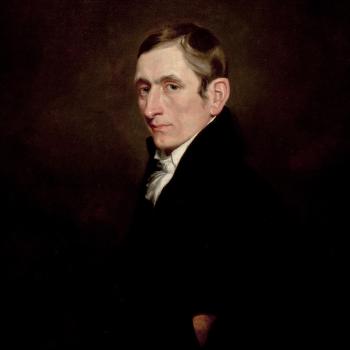A recent e-mail conversation with Lauren Winner raised an important question – in the view of Jonathan Edwards and similar eighteenth-century evangelicals, do the emotions become more, or less, central to the Christian life as the believer proceeds in sanctification? After the resurrection, and during the millennial reign of Christ, will believers’ emotions be “engaged and firing”?
Contemporary evangelicals often are suspicious of emotions or the “affections.” How many times have I heard people say something like “don’t base your faith on feelings, but on the Word of God!” Fair enough – just because you’re struggling with discouragement or depression does not change anything about God and His character. But as students of Edwards (and readers of John Piper) know, feelings are actually an indispensable part of the mature Christian life. Edwards suggests (as Dr. Winner suspected) that in our resurrected state, our affections will be even more attuned to and delighting in God’s glory.
Edwards wrote in The Miscellanies no. 721 that
“As the saints after the resurrection will have an external part, or an outward man, distinct from their souls, so it necessarily follows that they shall have external perception or sense. And doubtless then all their sense, and all the perception that they have, will be delighted and filled with happiness. Every perceptive faculty shall be an inlet of delight. Particularly then, doubtless they will have the sense of seeing, which is the noblest of all external senses; and then without doubt, the most noble sense will receive most pleasure and delight. The sensory will be immensely more perfect than now it is. And the external light of the heavenly world will be a perfectly different kind of light from the light of the sun, or any light in this world, exciting a sensation or idea in the beholders perfectly different of which we can no more conceive than we can conceive of a color we never saw, or than a blind man can conceive of light and colors— a sort or light immensely more pleasant and glorious, in comparison of which the sun is a shade, and his light but darkness. And this world full of the light of the sun is a world under the darkness of night, but that a world of light, affording inexpressible pleasure and delight to the beholders immensely exceeding all sensitive delights in this world.” [bolds added]

For Edwards, then, the problem is not our emotions per se, but unsanctified emotions. The kinds of craven, temporary pleasure we derive from lust or greed takes us away from the superior delights of the glory and grace of God. But as we grow into greater maturity, our taste for God’s goodness, and our distaste for sin, becomes more refined.
In the totally sinless state of our resurrected bodies, our senses will also be sanctified. Far from being muted or irrelevant, they’ll be “immensely more perfect” than what they are now. We will perfectly delight in that which we were designed for.
Edwards would caution us not to disparage the role of the emotions, but to cultivate the right kind of emotions. For Christians, this holy cultivation is part of sanctification. In the end, we will perfectly delight in the things of God.
See more generally Jonathan Edwards, Religious Affections.
[Friends, you can sign up here for my Thomas S. Kidd author newsletter. Each newsletter will update you on what’s happening in my writing and in the world of American religious and political history, and current events. It will contain unique material available only to subscribers, and each will help you keep up with my blog posts, books, and other items from around the web. Your e-mail information will never be shared. Thanks!]












